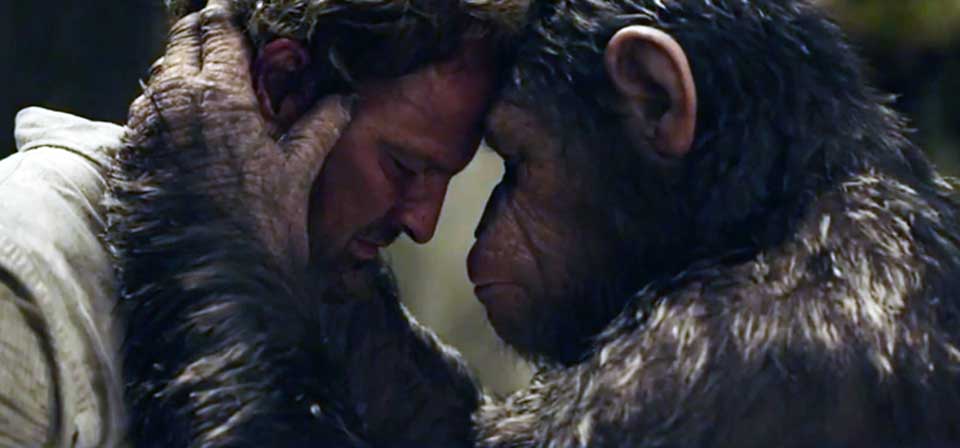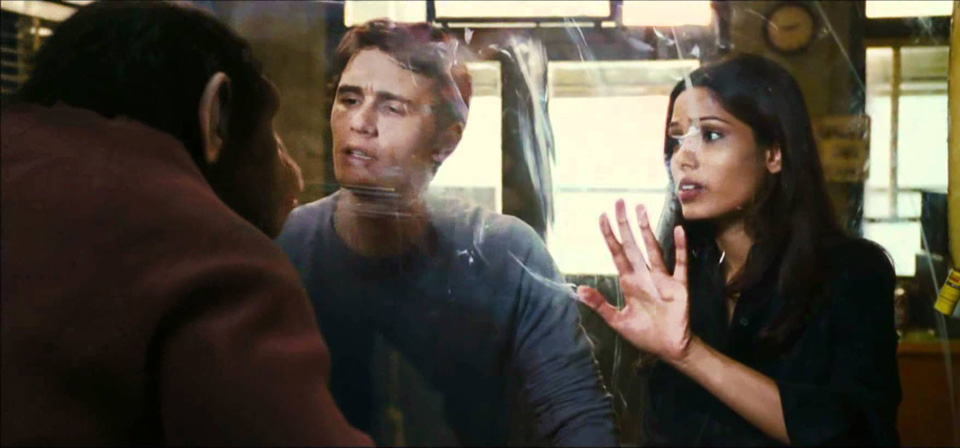War For the Planet of the Apes (2017)
How? How did this happen? How has 20th Century Fox’s rebooted Planet of the Apes series emerged, against all odds, as the most compelling, most morally resonant franchise of our times?
That’s not a merely rhetorical question. Too often I find myself in the melancholy position of trying to articulate why a movie I ought to like doesn’t work for me. War for the Planet of the Apes poses the opposite challenge: This is a film that, on paper, ought to leave me cold, but instead seared into my mind like a house on fire.
Caveat Spectator
Some intense battlefield violence; moderate depictions of torture, imprisonment and forced labor; a mercy killing and a suicide (both off-screen); limited profanity.When Rise of the Planet of the Apes opened six years ago, I found it smartly made but lacking subtext or allegory: a nightmare fantasy verging toward misanthropy, if not nihilism.
War for the Planet of the Apes seems superficially like an extension of that vision: Humans are now effectively the antagonists, even the villains, and the series arc dictates that they’re on the way out. It seems the epitome of the sort of bleak, post-human blockbuster I might be expected to hate.
But a funny thing happened on the way to the apocalypse. Between the inaugural Rise of the Planet of the Apes and the current threequel War for the Planet of the Apes came the middle movie Dawn of the Planet of the Apes (one of my top 10 films for that year).
With a new director, Matt Reeves, and a screenplay reworked by Mark Bomback, Dawn brought a sense of moral force and deeper meaning lacking in Rise, with impending doom threatening two communities, humans and super-apes, tragically caught between better and worse impulses on both sides.
Reeves and Bomback bring the same humanistic spirit to War for the Planet of the Apes, though the tide has now turned to the point where War is no longer a drama of two communities, but a chronicle of evolved apes enduring the worst that tribal humanity in extremis has to offer.
Rise was about humans abusing apes, too, but without the thematic depth. For one thing, it didn’t sufficiently distinguish between scientifically enhanced super-apes like the young chimp Caesar (motion-capture maestro Andy Serkis) and non-enhanced apes like the ordinary orangutan Maurice (Karin Konoval), who could sign just as intelligibly as Caesar.
In the increasingly allegorical sequels, with the spread of the ape-enhancing virus that wiped out most of mankind, Caesar’s simian community are simply rational animals, no less than the humans, and unlike ordinary beasts. (In Dawn, the vengeful bonobo Koba took some armed humans off guard by playing dumb and acting like an ordinary ape.)
Now the series takes another step toward the world of the original 1968 Planet of the Apes, in which evolved apes were rational animals and the mute humans seemed to be something less.
War finds Caesar and his band of followers defending their territory in Muir Woods from human military attackers, but contemplating a migration to a safer, more remote location.
The first act recaps the series’ point-of-view reversal. The film opens with human soldiers in the foreground and apes appearing as shadowy, intimidating figures on the horizon. After the opening sequence, though, the humans recede and are thereafter seen from the apes’ perspective, as menacing figures preferably seen from a safe distance.
In a clever twist, the human attackers are aided by ape collaborators who feel their best chance of survival is siding with the numerically challenged but technologically and tactically superior human forces. (The humans call the collaborators “donkeys,” which I took at first to be a derogatory play on “monkey,” but seems to be a reference to Donkey Kong — an archaic reference in a world without conventional electronics.)
One thinks here of the plight of Iraqi and Afghan translators who worked for the U.S. military in return for promises of help and safety, and have since been blocked from entering the U.S., or are here but face deportation, or have families in the Middle East living under constant threat of Taliban or ISIS retaliation. It’s not the same, certainly (these humans want to exterminate Caesar’s entire community, who are nothing like the Taliban or ISIS), but it’s too close for comfort.
The soldiers’ commanding officer, known as the “Colonel” (Woody Harrelson), inspires cult-like devotion to his troops as they prepare for what they believe may be humanity’s last stand.
Casting the military as bad guys may be a tired Hollywood trope (tough-as-nails, often ruthless, amoral colonels from Apocalypse Now to Avatar actually have their own dedicated page at TVTropes.org), but as the story unfolds it becomes clear for various reasons that this isn’t a standard or representative depiction of military forces.
Harrelson’s performance finds the twisted humanity in a shrewdly written character, making him far from a rote movie villain. “This is a holy war,” he tells Caesar. “All of human history has led to this moment.”
The Colonel wraps himself in a perverse distortion of both nationalist and religious symbolism. In one disturbing sequence, ape prisoners are ritually beaten to the canned strains of The Star-Spangled Banner, and an American flag is unfurled marked with an Alpha and Omega — an allusion to the Alpha-Omega doomsday bomb of the original Planet of the Apes sequels, and now the name of the Colonel’s regiment, but also evoking, of course, the Alpha-Omega monogram of Christ.
Heightening the religious resonances, the Colonel wears a crucifix, and at one point he even makes the Sign of the Cross over his men in a mock blessing, though his rhetoric is pure Darwinian-inflected tribalism.
Is this one more negative Hollywood association of patriotism and religion with villainy? It could be taken that way, but I think it’s best seen as the kind of superficial co-opting of patriotic and religious symbolism appropriate to this kind of villain in this sort of situation.
War is structured as a mash-up of two familiar genres: a revenge plot and an escape movie.
The revenge plot is precipitated by an unfortunate storytelling choice (this is a spoiler, but it’s in the early going): In the first act, Caesar’s wife, Cornelia (Judy Greer), and oldest son, Blue Eyes (Max Lloyd-Jones), are killed in a raid on their secret base. This is unfortunate partly because killing off the hero’s wife as a motivating device is one exhausted cliché War doesn’t refurbish in any way, and also because War, like its predecessor, is severely short on female characters, and Cornelia could have been a valuable presence.
Now Caesar — despite criticizing his late former antagonist Koba for his inability to forgive humans — finds he can’t forgive himself. When he decides to abandon his tribe to embark on what seems a self-absorbed, doomed mission of revenge, even the placid orangutan Maurice (Karin Konoval) remonstrates with him: “Now you sound like Koba.”
Note how the moral themes of Dawn deepen here. Dawn revealed that there was good and bad in both populations; on the ape side, Caesar was good and Koba was bad. Now Caesar — who killed Koba at the end of Dawn, declaring him to be “not ape” — finds that the evil of Koba lives in his own heart. It’s the same insight that precipitated a crisis for Darren Aronofsky’s Noah: Even if God wipes out all of wicked humanity except for his own family, the same potential for violence resides in his own heart.
If Caesar is a kind of Moses figure, a lawgiver (“Ape not kill ape”) who liberates his people from slavery and leads them to freedom, he is also, like Moses, a flawed leader shepherding his people toward a promised land he cannot enjoy himself, where he must pass the torch to another.
The role of Joshua falls to Maurice, whose compassion for a vulnerable, compromised young human girl (Amiah Miller) plays an unexpected role in the apes’ survival. (Maurice’s key virtues being compassion and gentleness, I’m reminded of another bibilical successor, Solomon, who completed the temple his father David was not permitted to build, being a “man of blood.”) Another new companion, a young chimp called Bad Ape endearingly voiced by Steve Zahn, adds welcome comic relief in what would otherwise be a bleakly serious picture.
The biblical analogies aren’t gratuitous; in the end the film takes an apocalyptic turn evoking at once the flood and the parting (or un-parting) of the Red Sea. Yet in the very end I think we are again meant to empathize with both sides: to see the final moment of conflict in terms of unfortunate but inevitable fear and mistrust rather than evil or oppression.
“The way to love anything,” wrote G.K. Chesterton, “is to realize that it might be lost.” Taken as a whole, and despite my reservations about the first installment, the rebooted Planet of the Apes series is somber but not misanthropic, dire but not nihilistic.
Who would have thought that, of all recent sci-fi/action films, the values of mercy, empathy and the preciousness of life would be most clearly expressed, not in the latest installments of the once-optimistic Star Trek or Star Wars franchises, but in a downbeat series about the end of human civilization?
Related

Dawn of the Planet of the Apes (2014)
Wait, where did this movie come from? Dawn of the Planet of the Apes is so not the sequel to Rise of the Planet of the Apes I expected or was prepared for.

Rise of the Planet of the Apes (2011)
Rise of the Planet of the Apes is a smartly made, effective movie — but what sort of movie is it, exactly?
Recent
- Benoit Blanc goes to church: Mysteries and faith in Wake Up Dead Man
- Are there too many Jesus movies?
- Antidote to the digital revolution: Carlo Acutis: Roadmap to Reality
- “Not I, But God”: Interview with Carlo Acutis: Roadmap to Reality director Tim Moriarty
- Gunn’s Superman is silly and sincere, and that’s good. It could be smarter.
Home Video
Copyright © 2000– Steven D. Greydanus. All rights reserved.